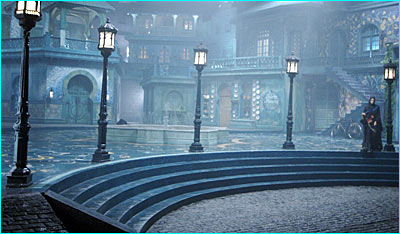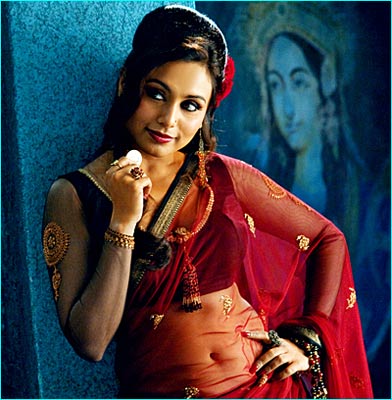Courtesy:mumbaimirror.com
Saawariya
Director: Sanjay Leela Bhansali
Actors: Ranbir Kapoor, Sonam Kapoor
In what may have become a stock role for her now, Rani Mukherjee plays a prostitute, Gulab (or Gulabji), in this film. She is in love with her young hero (Ranbir) who has fallen for a demure Indian beauty he'd met only the previous evening.
The young boy calls himself Raj. He had just landed into a strangely fictional, unpopulated whore-house town of blue home dcor, coloured lights, fancy boats, and a delicate bridge. He'd bumped into a lonely girl Sakina (Sonam) he immediately fancied as his own. Gulabji had warned her friend then, "Don't love someone so much that you begin to hate yourself." The advice proved prescient. His love may have been as instant as inexplicable. The girl's denial had a meaning. She said she belonged to someone else, one Imaan (Salman Khan). She said she'd prefer to wait for him.
The night the hero realises he is unlikely to have luck with his lady, he walks up to Rani's Gulabji to sleep with her. She turns him down: "Kaagaz ke phool se kabhi ittar bante dekha hai?" (Ever seen perfume getting extracted from a fake flower?). Earlier, explaining her profession to the hero's old landlady (Zohra Sehgal, a gentle casting touch there), she'd said, "You have an ancestral home, you made a guest-home of it. I had a body; I made a guest-home of that. We're in the same business."
Some more such gems emanate from Gulab; plain banalities from elsewhere. When you sense this lack of lyricism around, it seems odd that the writers could have rested all their poetry into one character. And not even a principal one at that. Gulabji is at best the Chandramukhi to her shaved Das (from no assigned period of course). She appears for a few minutes. She narrates this story of unrequited love. The film has no setting either, much like Bhansali's last (Black).
The director does make it clear this time though, that the silly special effects of a place unknown (and other well-lit wood-work you see) are merely of the narrator's imagination.
The hero sings at a bar called RK. The rain, the black-umbrella and the Chaplin-hat come from the same studio the bar pays its tribute to. So does the hero initially, borrowing in heavy doses mannerisms from his late grandfather, Raj Kapoor.
The similarities end there. This is in every way a faux, affected Broadway or West-End musical shot on 70 mm celluloid: the way the West naively assumes a Bollywood movie is. I am not surprised Sony Pictures, a top Hollywood studio, green-lit this as their entry into Bombay cinema.
Bhansali carefully chose his leading couple from the mom-and-pop store movies in Mumbai get made from. The move made commercial sense. He gives them instead much less scope to prove any skills. Ranbir spends most of his screen-time a self-aware drama-king. Sonam remains forever a dimpled, grinning portrait of awkward reticence that's passed off for feminine charm.
The picture itself then is merely a post-card, where every passionate aspect draws attention to itself, but the protagonists, or their intimate story. The dirt from the carpet blowing in the wind as the leading lady walks through it; the white clock tower that faces the imagined town; the huge bust of Buddha by it…
You notice everything, but care least for the two reasons this was probably intended as a tale of blind, idealistic love. The director is evidently busy proving himself as the master of images. It is much easier to connect with choreography, song or architecture; harder to appreciate them so disjointed or disconnected from an emotional core. Sensations are undone by cinematic ambitions. And you can rarely tell a tingling warmth beneath that grand, cold ornamentation.
Fyodor Dostoevsky may have disapproved. So perhaps Luchino Visconti or Robert Bresson, both directors who have filmed the Soviet writer's short-story (White Nights) before.
Before the publicity-industrial complex from Patna to Piccadilly Circus took over in 2005, Bhansali's Black was largely a moving film. Overrated; yes. But that's a knock on the rating. Saawariya is not even vaguely poignant, touching or weepy. It misses you almost entirely. The review ends here. May the myth prosper!











































5